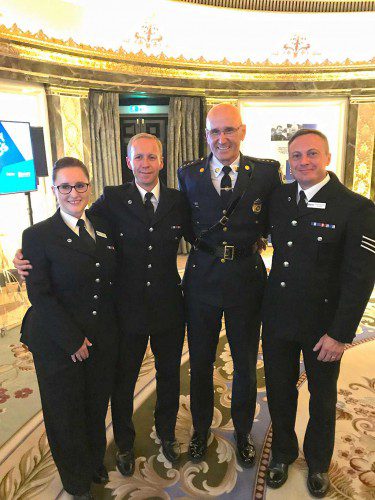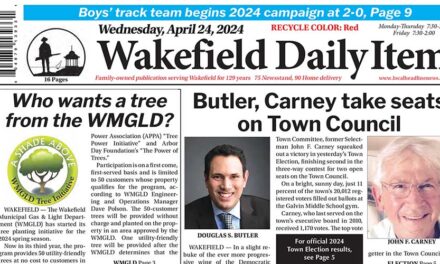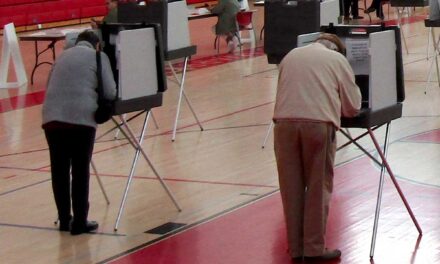Published in the July 19, 2017 edition

POLICE CHIEF RICK SMITH (second from right) met with the recipients of the UK 2017 Police Bravery Awards, Northumbria Police Service Officers PC Sarah Currie, PC Michael Otterson, and Sgt. Elliot Richardson. Smith was in England last week to address the National Police Chiefs’ Council.
By MARK SARDELLA
WAKEFIELD — “It was quite an education,” Police Chief Rick Smith said upon returning from a trip to England last week where he was invited to speak to the National Police Chiefs’ Council (NPCC), an association of more than 40 chief constables from major metropolitan areas throughout the United Kingdom covering England, Wales, Scotland and Northern Ireland as well specialist police forces such as the British Transport Police, Ministry of Defence Police and the Civil Nuclear Constabulary.
Chief Smith, who is a vice president of the International Association of Chiefs of Police (IACP), was asked to speak to the NPCC about 21st century policing in America as laid out in the Report of the President’s Task Force on 21st Century Policing, published in 2015.
Smith spoke to the NPCC last Wednesday as part of what was a spirited and dynamic exchange about the differences in policing in the U.S. and the UK.
“One of the biggest differences,” Smith said, “is they don’t have guns. As a result of that, gun violence is nil in the UK because bad guys don’t have guns, nor do police.”
While there are special forces with access to firearms that can be called upon when needed, rank and file municipal police officers, Smith said, “carry a baton, a taser and a chemical agent and that’s it.” One British chief constable told Smith that there hasn’t been a police officer killed in the UK in three years.
Asked if he thought such an approach would work in the U.S., Smith was skeptical.
“I believe it would work,” Smith said, “but it’s not going to happen. Americans love their guns. From a rights perspective, Americans believe they have a right to carry firearms. If you look at it from a crime and violence side, it makes no sense to have all these guns on the street.”
The suicide rate among British police is a fraction of what it is in the U.S., which Smith attributes to the fact that British cops do not bring guns home.
British police officers face many of the same issues as American officers when it comes to race, addiction, homelessness and terrorism, Smith observed.
He said that the Brits approach terrorism from a different angle. Being an island country about the size of Pennsylvania with many ports of entry, they feel more vulnerable, he said. They have ways of securing cities to reduce terrorism, Smith said, and they employ a strong intelligence network as well as a large contingent of undercover and plain clothes police officers. They use a system of barriers and stanchions to prevent vehicles from being used as weapons in open areas.
“They seem proactive and not afraid to make adjustments in living,” Smith said, “for example, no trashcans.” He said that while you don’t see any trash cans in the subway or train platforms, there’s no litter around.
When it comes to addiction, Smith said that Britain has been battling the problem of drugs for a long time. He said that they were following the U.S. model and have taken on addiction as public health issue and a mental health crisis.
Smith said that his British counterparts wanted to know how policing has changed in the U.S. with the change from the Obama to the Trump administrations. They also asked about sanctuary cities. Smith said that he told them that “sanctuary city” was nothing more than a term. “It’s not supported,” he explained. “It’s not an organization. It has no funding, it has no leadership and it has no home.”
Still, Smith expressed his belief that it was important to law enforcement to keep a dialog open with the immigrant community. He said that was the biggest difference between the Obama and Trump administrations
“We don’t want to become immigration officers,” he said. “That’s not our job. We have enough to do.”
Smith said that the British have much the same philosophy of community policing as we do and they recognize the value of getting out into the community.
“It was a great honor to be the lone American in the room,” he said, “not only to tell them about the work of the IACP, but to also tell them about the work of the report of the President’s Task Force on 21st Century Policing.”
Smith said that most of the conversation focused on how police in the U.S. implement the six pillars of 21st century community policing as outlined in the report.
• Building Trust and Legitimacy.
• Policy and Oversight.
• Technology and Social Media.
• Community Policing and Crime Reduction.
• Training and Education.
• Officer Wellness and Safety.
But wasn’t all work. Smith says that he had a little time to take in the sights around London, but he also took every opportunity to approach on-duty officers and get their perspectives on their work.
He also attended an awards ceremony for police heroism where he met the Duchess of Wessex, wife of Prince Edward, younger brother of Prince Charles.
“They loved the uniform of the only American in the room,” Smith said.
Smith said that it was the first time he had traveled to Britain and he found the country to be very welcoming.
“The British people treated me like a king,” he said. “They couldn’t do enough to make my stay comfortable. It was a great chance to extend an international handshake to our brother and sister officers in the UK.”




